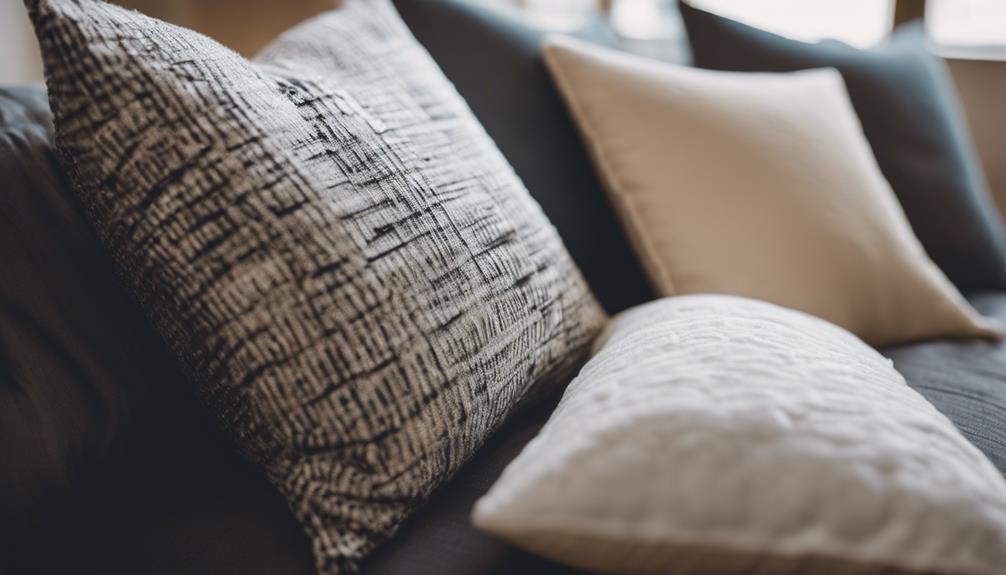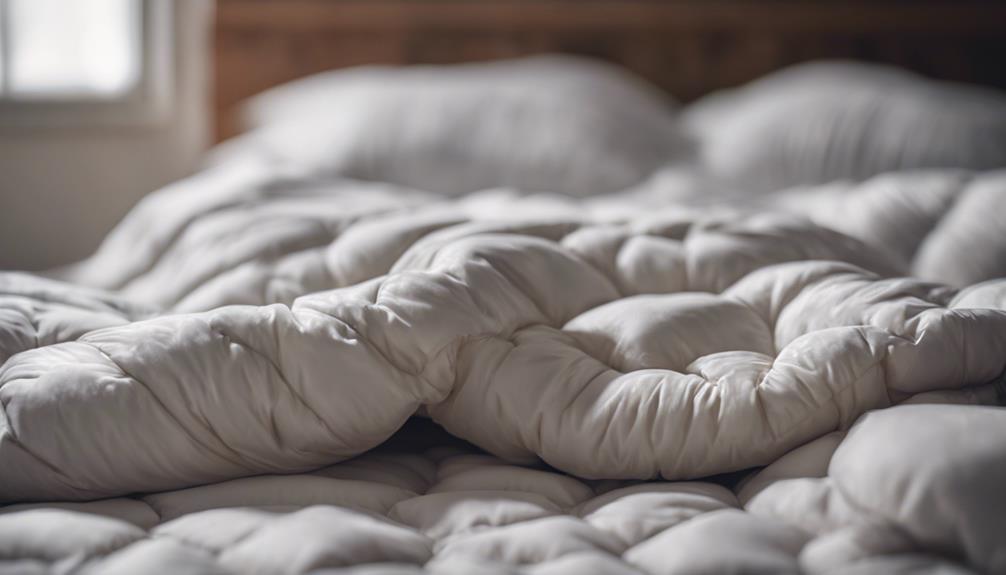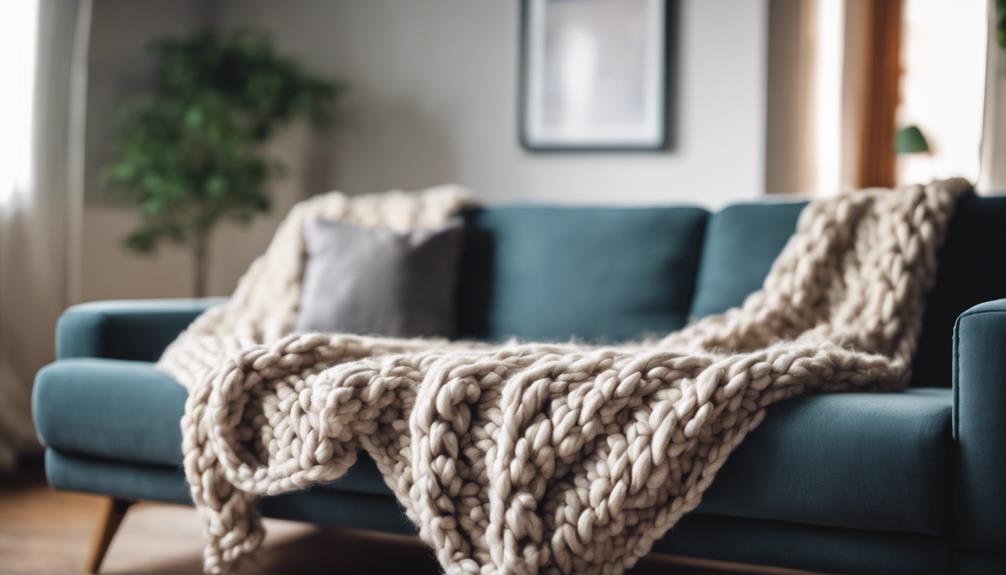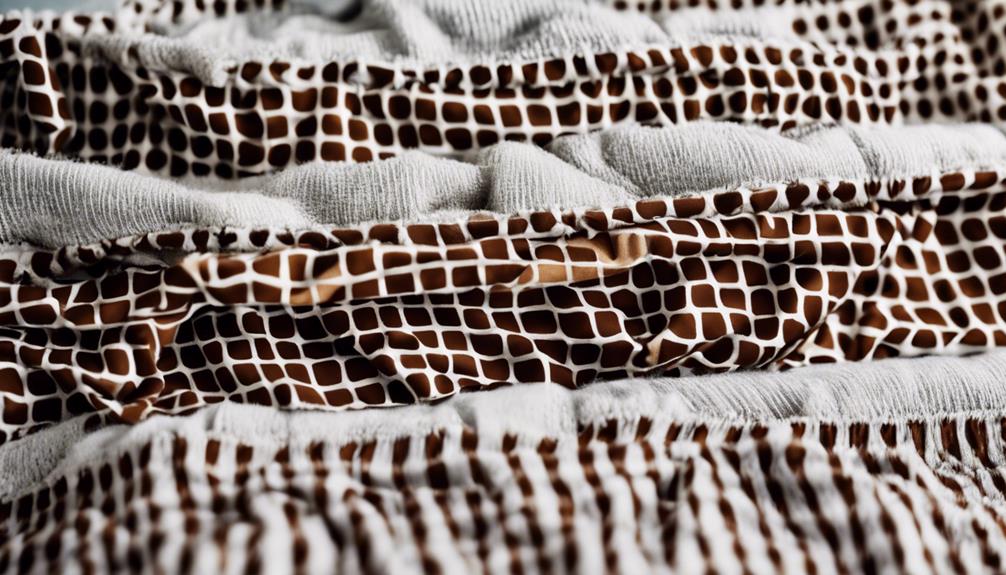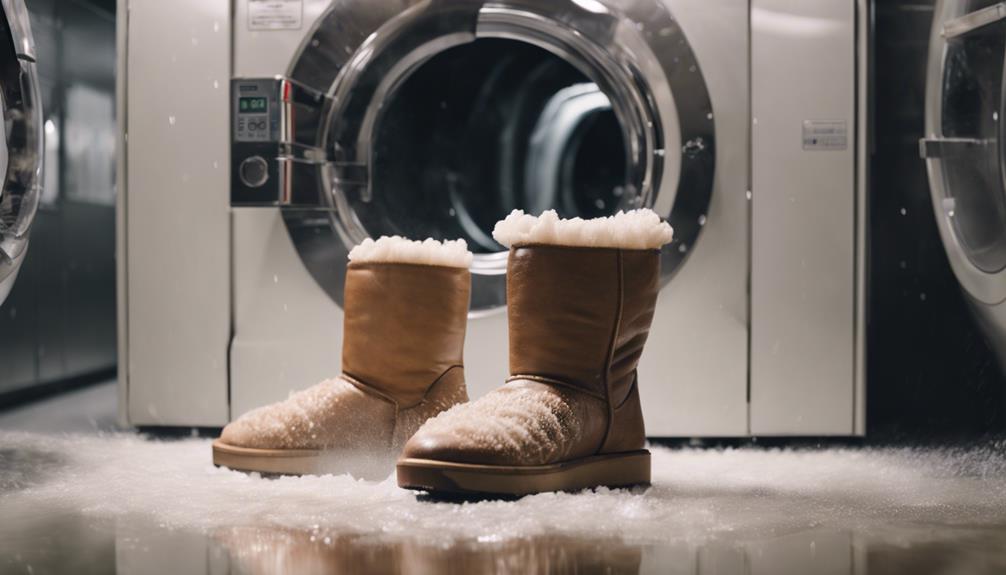When purchasing a throw pillow, the cost can vary depending on factors such as fabric, labor, and additional elements like trims. Fabric prices can range from $5 to $20 per cover, with labor costs falling between $25 and $30, all impacting the final price. If you are considering a do-it-yourself approach, anticipate spending $5 to $12 per pillow. However, opting for custom-made pillows could increase the price to $20 to $80 due to the use of higher quality materials and labor expenses. The choice of trims, such as piping or tassels, can also influence the overall costs. To get a better understanding of pillow making expenses, take into account factors like fabric quality, labor fees, and design complexities.
Key Takeaways
- Fabric costs range from $5 to $20 per pillow cover.
- Skilled labor costs for sewing fall between $25 to $30 per pillow.
- Custom features like cording or zippers can increase costs.
- DIY throw pillows cost $5 to $12, custom-made range from $20 to $80 per pillow.
- Labor charges and fabric choice significantly impact throw pillow costs.
Factors Affecting Pillow Making Costs
When considering the costs of making throw pillows, the price is greatly influenced by various factors. The type of pillow fabric chosen plays a significant role in determining the overall cost. Upholstery fabrics, which range from $10 to $20 per pillow, are a popular choice due to their durability and aesthetic appeal. Additionally, our sewing skills impact costs, as labor charges typically range between $25 to $30 per pillow. Those with advanced sewing abilities may opt for intricate designs or custom features like cording, zippers, or trim, which can add extra charges to the base price.
Choosing the right pillow fabric is essential, as it not only affects the cost but also the final look and feel of the pillow. Furthermore, our sewing skills determine how efficiently we can bring our pillow design to life. By considering these factors carefully, we can create beautiful throw pillows that suit our style and budget.
Importance of Fabric Choice
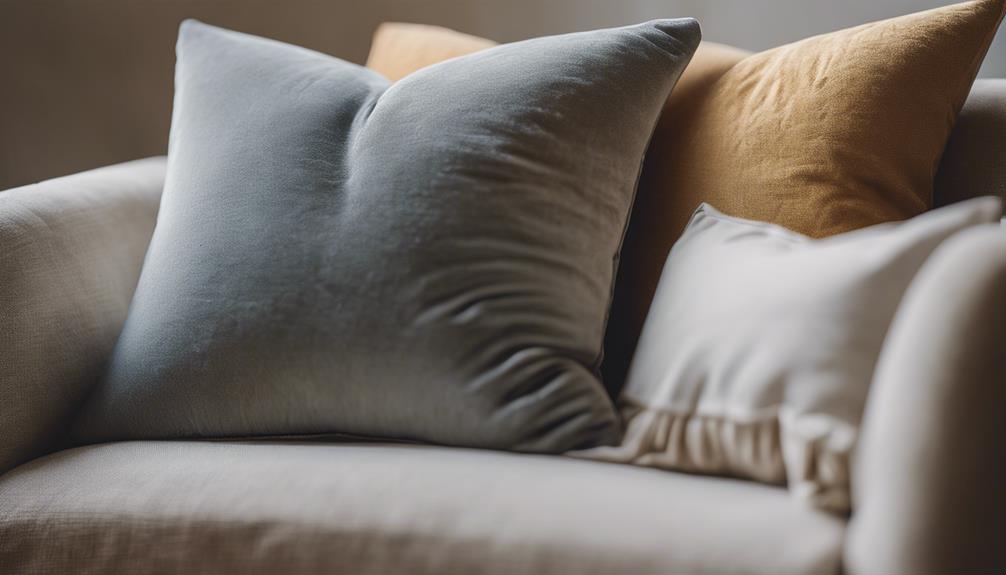
Fabric choice plays a significant role in determining both the durability and appearance of a throw pillow. When selecting the fabric for your throw pillow, it's important to take into account factors such as the type of fabric and its intended use.
Upholstery weight fabrics like cotton twill or Sunbrella are recommended for their durability, ensuring the pillow withstands daily use without losing its shape or color. Different fabrics offer a range of textures, colors, and patterns, allowing you to choose one that complements your decor style.
By choosing the right fabric, you can enhance the overall aesthetic of the throw pillow and create a cohesive look within your space. Ultimately, fabric selection is vital not only for achieving the desired look but also for ensuring that the throw pillow seamlessly fits into your room decor.
Make sure to keep both the visual appeal and practicality of the fabric in mind to create a throw pillow that's both stylish and long-lasting.
Cost Breakdown: Material Vs. Labor
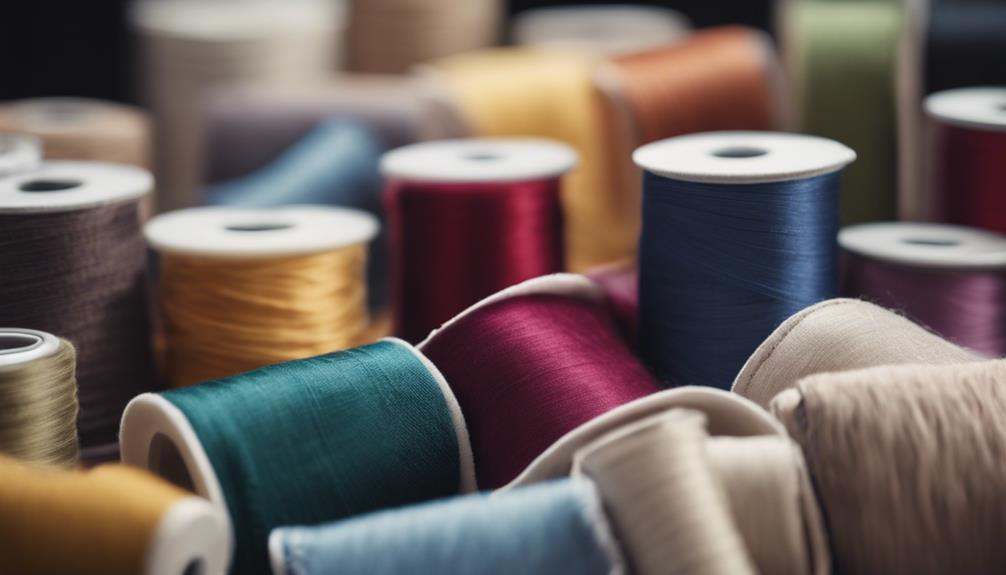
When calculating the cost of making a throw pillow, it's important to break down the expenses into material costs, which encompass fabric and pillow inserts, and labor costs for sewing.
Material costs can vary widely, from a few dollars for basic fabrics to $10-$20 for upholstery fabrics per pillow cover. Understanding the distribution of material versus labor expenses is key to determining the overall production costs of crafting a throw pillow.
Material Cost Breakdown
In determining the overall production cost of a throw pillow, it's essential to carefully analyze the breakdown between material expenses and labor costs. Fabric cost plays a significant role, ranging from $5 to $20 per pillow cover. This expense varies based on the quality and type of fabric chosen for the pillow.
On the other hand, labor cost for making throw pillows typically falls between $25 to $30 per pillow, excluding fabric and inserts. Skilled labor is required for tasks such as cutting, sewing, and stuffing the pillow.
When producing custom throw pillows, the overall cost tends to be higher due to the use of expensive fabrics and the need for skilled labor.
Labor Cost Analysis
Examining the cost breakdown between materials and labor is crucial when determining the overall production expenses for creating throw pillows. Labor costs for sewing a throw pillow typically range from $25 to $30 per pillow, separate from materials like fabric and pillow forms.
Transparently separating labor fees from material costs aids in accurately pricing custom throw pillows. Clearly communicating labor charges to clients prevents misunderstandings and guarantees fair compensation for the time and expertise involved.
Setting a base labor cost per pillow helps uphold the value of the sewing skills and craftsmanship put into each custom throw pillow. Establishing boundaries and educating clients on the effort required for custom pillow projects reinforces the importance of valuing the expertise of the sewing work.
Total Production Expenses
Analyzing the total production expenses for creating throw pillows involves a detailed breakdown of material and labor costs. When considering the cost breakdown, it is vital to account for both the fabric used for the pillow and the labor involved in sewing it. Here is a breakdown of the typical expenses for making a throw pillow:
| Item | Cost Range |
|---|---|
| Fabric | $5 – $20 per pillow |
| Pillow Inserts | $Few – $50 per pillow |
| Labor (Sewing) | $25 – $30 per pillow |
Understanding these cost components is important in determining the total production expenses for each throw pillow. By carefully analyzing material and labor costs, one can make informed decisions about pricing and production strategies.
Cost Comparison: DIY Vs. Custom-Made
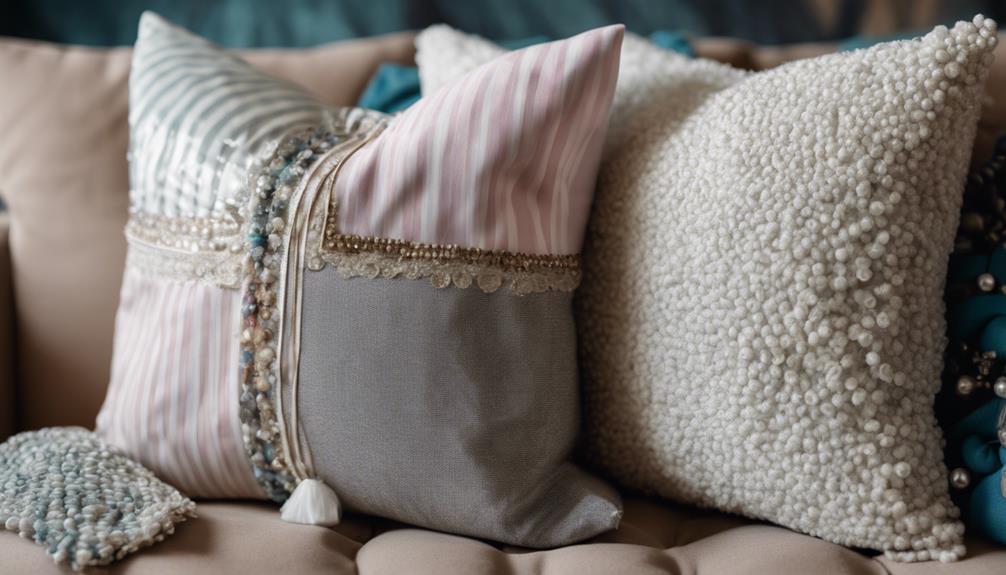
Let's compare the costs of making throw pillows through DIY methods versus opting for custom-made options. When it comes to pillows, choosing the do-it-yourself route can be a budget-friendly choice, with DIY throw pillows costing approximately $5 to $12 per pillow. In contrast, custom-made throw pillows can range from $20 to $80 per pillow due to the higher costs associated with expensive fabrics and labor.
The significant price difference between DIY and custom throw pillows is primarily due to the materials and labor involved. DIY throw pillows offer cost-effective opportunities by allowing you to creatively source affordable fabrics like repurposed tablecloths or dish towels. On the other hand, custom-made pillows are pricier because of the customization options available and the higher quality materials used in their production.
Additional Trimmings Impact on Price

When considering the cost of making a throw pillow, it's crucial to factor in the impact of additional trims like pom-poms, tassels, ric rac, or piping. These decorative elements not only influence the overall price but also require extra materials and labor for attachment.
The type and quality of trim selected play a significant role in determining the final pricing of the custom throw pillow.
Trim Choices Influence Price
How do different trim choices influence the price of making a throw pillow?
The selection of trims such as pom-poms, tassels, ric rac, or piping has a notable impact on the production cost.
The price of these trimmings varies based on their type, quality, and the quantity used in the pillow's design.
Specialty trims with intricate designs may cost more than simpler options like piping.
While customized trims can enhance the pillow's aesthetic appeal, they may also raise the overall production expenses.
It's important to balance the desired look with the budget constraints when choosing trims to make sure they complement the pillow without exceeding the target price point.
Consideration of both design preferences and financial limitations is essential in making trim selections.
Labor Costs for Trimmings
Exploring the labor costs associated with different trims for custom throw pillows provides insight into how additional trims impact the final price. When considering labor costs for trims on custom throw pillows, it's important to understand:
- Adding trims like pom-poms, tassels, ric rac, or piping can increase the labor costs, affecting the overall price of the pillow.
- Labor costs for trims vary based on design complexity and detailing involved.
- Intricate trim work demands more time and skill, ultimately impacting the throw pillow's price.
- Skilled labor is vital to ensure precise attachment of trims, resulting in a professional and polished finish for the custom throw pillow.
Tips for Budget-Friendly Pillow Making

To save money while making throw pillows, we can explore DIY options and creatively source fabrics to keep costs low. DIY options can greatly reduce expenses compared to purchasing store-bought pillows.
By utilizing creatively sourced fabrics such as tablecloths, dish towels, and napkins, we can bring down the costs to a budget-friendly range of $5-$12 per pillow. Upholstery fabrics, which can cost between $10-$20 per pillow, are one of the key expenses to take into account in pillow making.
Opting for affordable fabric sources is important in maintaining a cost-effective approach to pillow making. Additionally, DIY tutorials provide step-by-step instructions and videos that can guide us through the process of creating beautiful throw pillows without breaking the bank.
Pricing Guide for Different Pillow Sizes
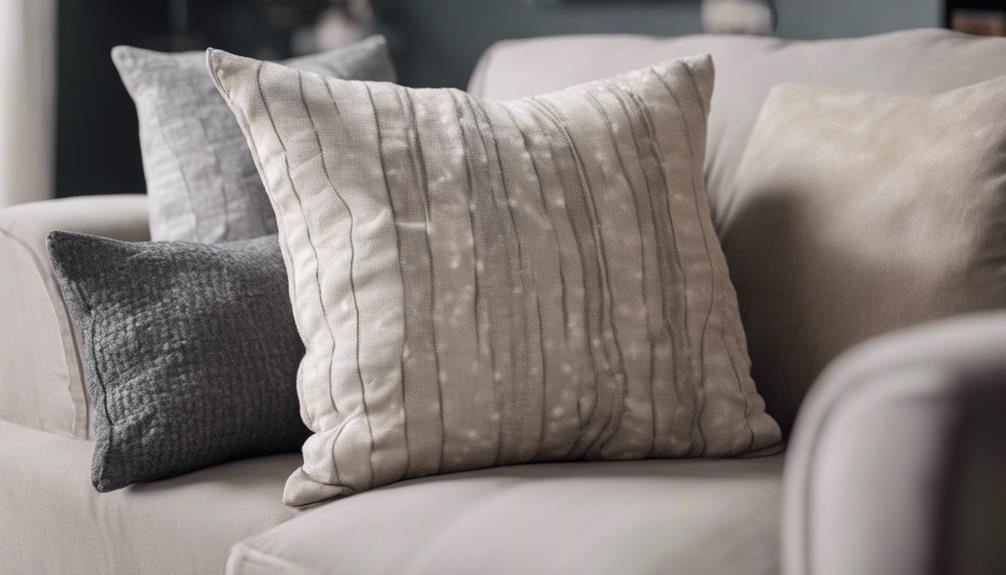
When pricing custom throw pillows based on different sizes, consider the standard range of $20-$80 per pillow as a starting point. Larger throw pillows or specialty designs may cost more due to increased material requirements and intricate craftsmanship.
Labor costs for making a throw pillow typically range from $25-$30 per pillow, depending on the complexity of the design. Additional features like cording, zippers, or trims can also increase the overall cost but add a touch of elegance to the finished product.
Custom throw pillows made with high-quality materials may have a higher upfront cost, but they can last for years, making them a worthwhile investment in your home decor.
Maximizing Value in Pillow Making
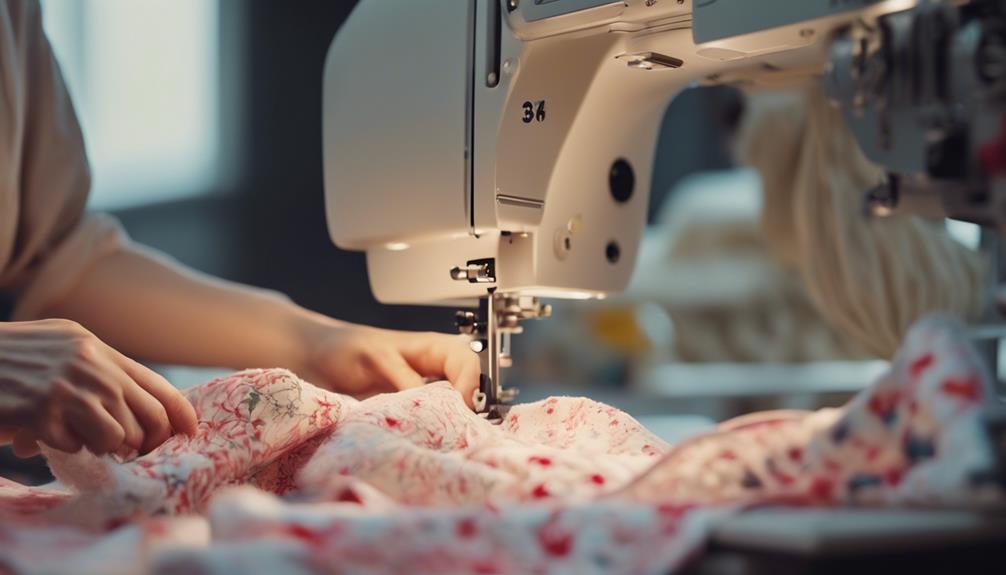
To maximize the value in pillow making, consider utilizing affordable fabric sources like tablecloths and dish towels. These materials can be repurposed to create unique throw pillows without breaking the bank. Upholstery weight fabrics are another excellent option to enhance durability and longevity in your throw pillows, ensuring that they maintain their value over time.
When making your own throw pillows, you have the freedom to customize openings with features like zippers, adding both functionality and value to your creations. Mixing and matching patterns in the fabric selection process can elevate the visual appeal of your throw pillows, increasing their perceived value.
Additionally, adding special trims such as pom-poms or piping can give your pillows a personalized touch, enhancing their overall custom look and value. By being resourceful with fabric choices and incorporating thoughtful design elements, you can maximize the value of your throw pillows while adding a personal touch to your decor.
Quality Assurance in Pillow Making
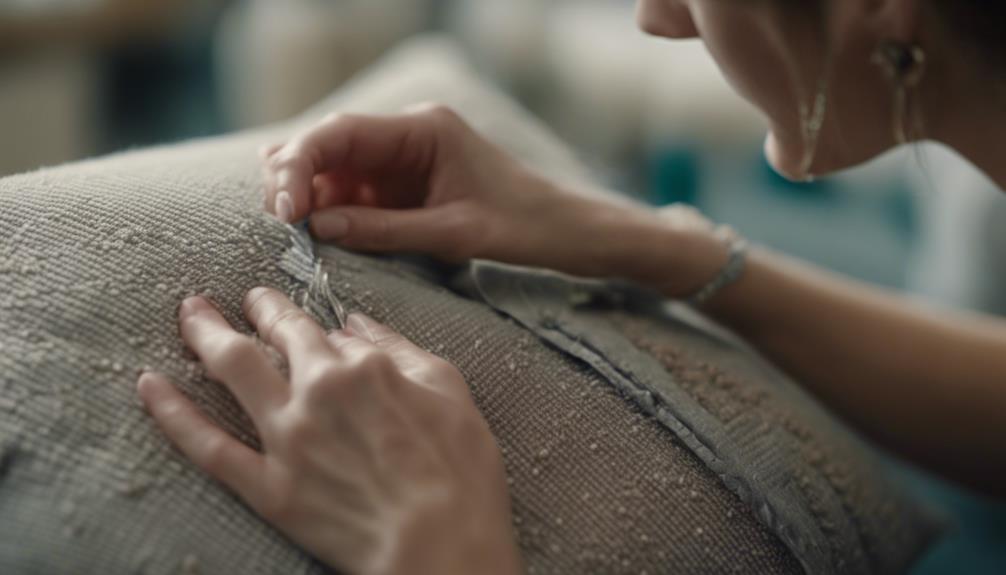
When crafting throw pillows, our team prioritizes material selection and precise stitching techniques to guarantee high-quality.
By meticulously inspecting seams, stitching, and fabric alignment, we assure a flawless end product.
Attention to detail in these areas is essential for creating throw pillows that are both visually appealing and comfortable.
Material Selection
Ensuring the quality and durability of throw pillows hinges greatly on the meticulous selection of materials. When choosing fabrics for pillows made at home or by professionals, it's crucial to keep in mind the following:
- Fabric Quality: Opt for high-quality upholstery weight materials for longevity.
- Recommended Fabrics: Cotton twill, cotton duck, indoor/outdoor fabric, Sunbrella, and linen blend are durable choices.
- Impact of Fabric: The weight and type of fabric chosen can influence the overall look and feel.
- Affordable Options: Look for durable fabric by the yard online to create long-lasting and visually appealing throw pillows.
Selecting the right materials is key to producing throw pillows that are both aesthetically pleasing and long-lasting.
Stitching Techniques
Selecting the appropriate stitching techniques is vital in ensuring the durability and quality of throw pillows. Proper stitching methods, such as backstitching and securing seams, play an essential role in preventing unraveling and maintaining the pillow's integrity over time.
Quality assurance in pillow making also involves maintaining consistent seam allowances to achieve a professional finish. Additionally, stitching techniques like topstitching not only add decorative elements but also reinforce the seams, making the pillow more sturdy.
Understanding different types of stitches, such as straight stitch, zigzag stitch, and overlock stitch, is essential for effective pillow construction. By implementing these stitching techniques correctly, we can create throw pillows that aren't only visually appealing but also long-lasting and durable.
Long-Term Investment in Custom Pillows
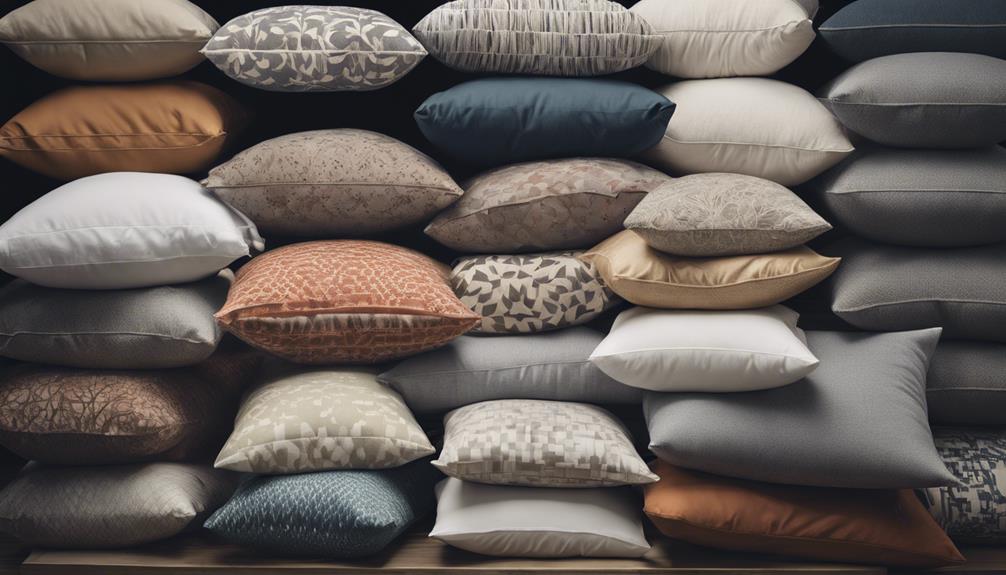
Investing in custom throw pillows guarantees a lasting blend of quality materials and personalized design that enhances both comfort and style for years to come. Custom pillows are crafted to stand the test of time, offering a unique touch to your living space that reflects your individuality.
Here are four reasons why a long-term investment in custom pillows is worthwhile:
- Durability: Custom throw pillows are constructed with high-quality materials and expert craftsmanship, ensuring they remain in excellent condition even after years of use.
- Personalization: With custom pillows, you have the freedom to choose designs, fabrics, and sizes that align perfectly with your decor preferences, adding a personal touch to your home.
- Aesthetic Appeal: The attention to detail in custom pillows results in a sophisticated and stylish look that elevates the overall ambiance of your space.
- Value Over Time: While the initial cost may be higher than mass-produced options, the longevity and enduring quality of custom throw pillows make them a valuable investment in the long run.
Frequently Asked Questions
Is It Cheaper to Make Your Own Throw Pillows?
It's definitely cheaper to make our own throw pillows! By using affordable fabric sources like tablecloths or napkins, we can customize pillows for $5-$20 each. Store-bought pillows can cost $20-$80, making DIY a budget-friendly choice.
Creatively sourced materials can even lower costs to $5 per pillow. DIY tutorials offer step-by-step instructions for chic pillows with zippers, making it a cost-effective way to spruce up home decor.
How Much Should a Throw Pillow Cost?
Throw pillow costs vary based on materials and labor. Factors like fabric quality, design complexity, and trim options influence pricing. Custom pillows range from $30 to $150 each. DIY options can be as low as $10 to $20. Labor costs average $25 to $30 per pillow.
Custom pillows offer unique designs to match your decor.
Is a Throw Pillow Business Profitable?
A throw pillow business can be profitable, with store standard throw pillows ranging from $20-$80. Custom-made pillows are pricier due to expensive fabrics and labor, offering a higher profit margin.
DIY custom pillows can greatly reduce costs, increasing profitability. Considerations like pillow inserts costing from a few dollars to $50 impact the overall cost and profit potential.
Creatively sourcing fabrics can bring down costs to $5-$12 per pillow, maximizing profits.
What Makes a Throw Pillow Expensive?
When it comes to the price of throw pillows, several factors can drive up the cost. Premium materials like down inserts and designer fabrics, along with intricate trims, can make a pillow expensive. Additional features such as cording, piping, or specialty embellishments add to the overall price.
The complexity of the design, hand-sewn details, multiple fabric layers, and special finishing techniques all contribute to the higher cost of custom throw pillows.
Can Different Types of Pillow Fillings Affect the Cost of Making a Throw Pillow?
When considering the cost of making a throw pillow, it’s important to factor in the different throw pillow filling options. Synthetic fillings like polyester are often more affordable than natural fillings like down or feather. The type of filling can significantly impact the overall cost of creating a throw pillow.
Conclusion
To sum up, the cost of making a throw pillow can vary based on factors such as fabric choice, additional trimmings, and size.
While DIY options may save money, custom-made pillows offer quality and customization.
By understanding the cost breakdown and maximizing value in pillow making, one can invest in long-term comfort and style.
Whether you choose to create your own or opt for a custom design, the key is to prioritize quality and personal preference for a truly satisfying result.
